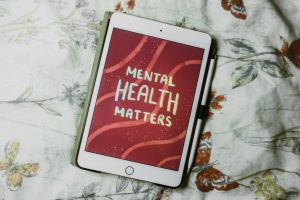Included in this article:
- Physical Health
- Mental Health
- Academic Habits
- Social Health
Success in college involves much more than understanding course material and getting a good grade; success involves developing life habits that will help you support your goals. The more you have worked to create such habits during middle school and high school, the easier and more enjoyable the experience will become, both in the present and future. This blog centers around sharing some of the most important healthy habits that are going to make all the difference in your life as a student. From time management and mental health to general success, these differing habits range in their coverage, but all will help you reach higher and higher levels of academic success.
Physical Health



1.1 Prioritize Sleep: The Ultimate Brain Booster
One of the most important, yet painfully neglected, aspects in the lives of the student body is sleep. Most students end up cheating on sleep for many reasons, ranging from studying all night for a test to binge-watching their favorite TV series. This can cause serious harm to their bodies, but many students continue this damaging behavior as they often underestimate the importance of sleep and would rather spend that time doing something else. These detrimental effects may easily spill over into your academic life. Sleep is given little to no priority and usually put on the back burner, and this needs to change if one wants to increase his chances at success.
- Why Sleep Matters
While you sleep, the brain automatically starts working on consolidating the information learned during the day. This can be academic material as well as experiences that one had during the day, thereby, making memories. If you do not give your brain this time, then you will only find that it makes it harder to focus and to remember basic things, which, in turn, can affect your problem-solving ability and critical thinking. It is not only crucial for your mental needs but also your body. You need to rest, especially because of how active you are throughout the day.
- How Much Sleep Do You Need?
Middle and high school students should have at least 8-10 hours of sleep. How does one achieve this? By developing a fixed routine with a set bedtime and time you plan on waking up. Be as consistent as possible, for that is what matters most. Another could be by not having caffeine in the afternoon and avoiding screen time before sleep. Research has shown that if you follow these two rules, you’re guaranteed a deeper sleep for longer.
1.2 Balanced Nutrition: Fueling Your Body and Mind
What you eat also affects your academic performance. Be sure to keep a balanced diet, as nutrition directly affects brain function. This includes the ability to learn as well as the skill to comprehend, both being necessary to excel.
- Start with Breakfast
Your morning should start with a healthy breakfast as it will provide you with the energy needed to be successful. A good, solid breakfast not only sets the tone in terms of energy but also is the first meal of the day, thus it also starts your metabolic process for the day. Because of this, you need various proteins, healthy fats, and whole grains included in the meal. These foods will keep you full and energized throughout the day.
- Snacking Smart
Snacking is allowed, but you have to be on the lookout for the ingredients they contain. Aim for foods that are rich in nutritional value and answer your cravings while avoiding the urge that their sugary counterparts provide. Good examples include fruits, nuts, and yogurt. These will fill you up while also helping re-energize your mind and body to take on the challenges of the day. Ensure that you remain balanced by not consuming snacks in abundance.
1.3 Regular Exercise: Keeping Your Body and Brain Active
Besides keeping the body fit, physical activity keeps the brain alert and ready. Constant physical exercise improves your memory, concentration, and overall mental condition by performing several functions in the brain. It does all that by causing increased blood flow to the brain.
- Incorporating Movement
Whether it’s playing a sport, going for a walk, or doing a quick workout at home, find activities to stay relatively active every day. Even small doses of physical activity can make a real difference in mood and energy levels.
- Exercise as a Stress Reliever
Sports is a perfect way to overcome stress, which every student goes through at one point or another. Yoga, running, etc. allow you to clear your head and give you heightened concentration when you are studying.
Mental Health
2.1 Mindfulness and Meditation: Tools for Stress Management
Middle and high school can be stressful, as far as academics, extra-curriculars, and socializing are concerned; it’s a lot of things hanging over your head. Developing good and healthy mental habits is just as important as it is to have good physical health during this time. To remain balanced, you must set aside a time to work on yourself, and that is where mindfulness comes into play.
- Mindfulness
Mindfulness is an activity that involves being in the moment without judgment. It helps people hold their attention on what they are doing at the moment and decreases anxiety about the future or regrets of the past.
- Practicing Mindfulness
Practicing mindfulness can be difficult. Some basic ways to begin include breathing exercises, short meditation sessions, or even using apps such as Headspace and Calm. Keeping the sessions short helps you stay consistent, as finding a way to stay mindful every day is the goal, whatever way that may be ensuring you are comfortable and reaping the benefits.
2.2 Time Management: Reducing Stress Through Planning
The sheer number of things a student has to worry about can easily lead to feelings of anxiety and concern. This includes homework, readings, projects, exams, clubs, etc. In order to combat this, students must focus on time management and staying responsible, as both of these things can reduce stress and help maintain good academic success.
- Planner/Digital Calendar
Keeping an academic planner is a great way to remain on top of everything. It allows you to structure your day and keep all of your commitments in one place. This simplifies things, leading to less instances of you missing an essay deadline or forgetting to submit your homework. You can keep track of how you spend your time, allocating certain time slots to studying, having fun with friends, taking a nap, etc. You will feel much more secure about your academic and personal life due to you having sat down and found the time to grow in both.
- Prioritize
Every student needs to learn how to prioritize. Not all tasks are equally important. In order to properly prioritize, focus on what requires immediate attention. This can be due to a variety of reasons, from the assignment being due earlier to it requiring more time. By employing these methods, you ensure that you take care of what needs to be done first and still have time for what you need to handle after.
2.3 Seeking Help: Don’t Be Afraid to Ask
Struggling, or simply feeling overwhelmed is ok. Not only is it ok, it’s normal. Every student goes through that, whether he can tell or not. The important thing is what steps you take to combat that feeling. Asking for help when you need it is the best thing you could possibly do in that scenario.
- Teachers + Counselors
Teachers and counselors are often overlooked when students find themselves struggling. This is a crucial mistake many make, as they are here to help you in any way that they can, so use the resources at your disposal. If you’re having trouble with a particular subject or dealing with personal issues that are affecting your schoolwork, don’t hesitate to reach out to those who are meant to help. They’re there to help you succeed, but the first step is to accept that you need it in the first place.
- Peer Support
Teachers and counselors aren’t always the solution, however. Look to your peers, as they can often be comfortable and efficient helpers when students find themselves in a difficult spot. They also may have either gone through or are going through something similar. People who have experienced what you are experiencing can oftentimes be the best teachers and give advice that will help you the most. This also translates outside of emotions and more directly into academics. Study groups and peer tutoring is a great way to get help with subjects you may be struggling in. Not only will you get the help you need, but also you may very well make some friends along the way.
Academic Habits
3.1 Active Learning: Engaging with the Material
Sometimes, actively listening to a lecture or reading and annotating a textbook isn’t enough. There are other ways to further your understanding and help you fully grasp the material. For any method of learning to be effective however, one must be actively learning. Active learning revolves around being present and engaging with the material to retain information and facilitate a deeper level of understanding.
- Notes
Note-taking is vital to grasping new content. Jotting down quick, concise, and efficient notes can help reinforce what you are learning. There are many different methods of note-taking, including mind mapping, the Cornell method, and others. The important thing is to be efficient. The purpose of notes is not to regurgitate every word the teacher said, but rather to identify and note down the key information needed. Simply writing it will help you remember and it also serves as a method for review before the quiz/test.
- Ask
If you are ever uncertain about a topic, ask. There is no limit to how many times you can ask either. Ask until you fully understand whatever it is. If you still don’t understand, meet the teacher after class, during lunch, or during office hours and ask them to explain again. Never be afraid to ask a question and never let your mind fool you into thinking that there is such a thing as a dumb question. Everyone faces moments when one needs further explanation, or simply for a teacher to repeat something so it may click in your mind. Teachers aim to teach, and answering questions is part of teaching. Not only will you be helping yourself, but also you may very well be helping your peers as well who may have that exact same question but lack confidence to speak up.
3.2 Study Techniques: Finding What Works for You
Everyone is different, and this also counts towards how we learn. In order to learn more efficiently, explore various learning styles and see what best suits you. Different styles work best for different situations, and having as many tools in your toolbox can come in handy later down the road. Find what works best for you and utilize those methods as much as possible.

- Repetition
Repetition involves moving information from your short-term memory over to your long-term memory by repeating information over and over. You continuously review the same material again and again over various intervals of time. This helps you retain the information for longer, and is a known study tactic proven to help the human mind retain more information.
- Practice Tests
Practice tests serve as an enactment of the real deal, allowing you to be more comfortable when taking the actual exam. They allow you to be more comfortable with the format, the timing, and the kinds of questions you will see on the exam. This greatly reduces stress on the actual day as you now have somewhat of an expectation and won’t be caught off guard by anything on test day. Practice tests also allow you to better understand where exactly you need further review, as you get to see what you got wrong. You can then strengthen the areas in which you are weak. Taking practice tests for math, science, and standardized testing is extremely important as they not only show you the things that you need to work on but also help you to have the confidence that you require for your desired grades.
3.3 Avoiding Procrastination: Staying on Top of Your Work
Many students, if not all, procrastinate at some point in school. Procrastination is a huge issue for most, as it causes unnecessary stress and can lower the effectiveness of a student. When you procrastinate an essay til the night before it’s due, the actual quality suffers greatly compared to if you had put in the proper time, giving yourself breaks and opportunities to proof-read rather than having to submit immediately. Procrastination hurts your academic performance as well as your mental well being. This goes back to the stress factor mentioned earlier, and the combination of both of these is why it is so important to develop strategies in order to avoid it as much as possible.
- Break It Down
Big assignments can often seem daunting, which is a major factor of why students procrastinate. In order to avoid procrastinating, break down the larger assignment into smaller ones. For example, give yourself a week to write an essay. Use one day to make the outline, another to write the intro, etc. This ensures the quality of work stays as high as possible while keeping stress levels as low as possible, which is exactly what every student should be striving for.
- Pomodoro Technique
The Pomodoro Technique centers around taking small, effective breaks rather than working non-stop. In order to do this, the student must create blocks to study for and then take a mandatory break for x amount of time. This is another example of breaking a larger task into smaller ones, but with respect to the time rather than the task itself. An example of this is to study for 25 minutes and then take a 5 minute break. This ensures that you stay efficient and focused for all 25 minutes, and taking a break is rewarding yourself for doing so. Another important aspect is ensuring all distractions are gone while you are studying in order to remain effective. When studying for hours at a time, you will notice that the efficiency has begun to fade more and more as you go further into your study. This is called burnout, and everyone experiences it. So in order to avoid it, use your time in a more productive manner.
Social Health
4.1 Building Supportive Relationships: Friends and Family Matter
Lean on the people close to you when you find yourself going through a difficult time. Every person has a support system, so make sure to take advantage of it, as it is important in order to maintain your mental health. Your support system is made up of your friends, family, teachers, counselors, etc. Anyone you can look up to who can offer any sort of guidance or help in your times of need is a part of your support group. Utilize them in whatever capacity you need, and never shy away from asking for help.

- Quality vs Quantity
The way you spend your time socially is very important. Branch out as much as you can, but always remember that quality is better than quantity in this regard. It is much better to have a few close friends who support you, share your morals, and value you as a person rather than a bunch of acquaintances who don’t care for you deeply. Focus on building meaningful connections and foster those relationships by spending your time on them. Again, be sure to meet new people and create new bonds, but always go back to those life-long friends and keep that bond strong, as they are the ones who will uplift you.
- Communicate
Always be open when it comes to how you communicate with others, especially your family, friends, teachers, and counselors. Open communication is the key to keeping your relationship strong and healthy. Never be too scared to share your feelings with them, ask them for help, or offer your own help to them if you see a need for it. Keep this honest, open, and simple, and the relationship will flourish.
4.2 Balancing School and Social Life: Finding the Right Mix
Academics are often viewed as the most important aspect of schooling, but make sure that you put away time for social activities as well. This is the time for you to spend with your friends, to relax, and to unwind. Many see it as unnecessary, but in order to excel academically, you need to give yourself proper rest. To be efficient, always aim to find the balance. Balancing your workload along with having fun will lead you to being efficient and happy, which is vital to your mental well being. Always take care of yourself, no matter the situation.
- Boundaries
There will be times when your friends want to go out whereas you planned on studying. You have to learn how to say no, otherwise you won’t find that sought after balance. Find what’s most important to you and work from there. This is why planning is also so important, as you can have set times for work and enjoyment. There will be times where you will be given the choice to either attend a social event or finish your work/study. In those situations, remain responsible and know that there will be other events in the future that better suit your schedule. Take the loss today to make tomorrow brighter, rather than affect your future for a short-term gain.
- Fun Time
You have to set aside some time to just enjoy life. Don’t get too caught up in the stakes and pile pressure upon yourself. Enjoy, let loose, and have some fun once in a while. Again, always have a balance in your life. Leaning too far either way is not healthy, so participate in extracurriculars you enjoy, hang out with friends, and go through experiences that will help you grow and contribute to your happiness.
Final Thoughts:
Middle and high school is the place to start developing good habits in order to be successful as you move on through life. These healthy habits you develop will hopefully have you lead a balanced life, with success both academically and socially. Some points to focus on include your mental health, practicing foundational academic habits, nurturing your relationships, and leaning on those around you. These will allow you to navigate through the struggles of school and grow up with more confidence. It’s not just about getting the grades; it’s about creating a healthy lifestyle that better prepares you for whatever life throws at you. However, doing all of these does not mean your life will automatically become easy, and you will no longer face any challenges. These habits put you in the best position to overcome those challenges, rather than help you avoid them. As a college student, I’ve learned that these habits are the foundation of success, and I hope this guide will help you on your journey to becoming the best version of yourself.





